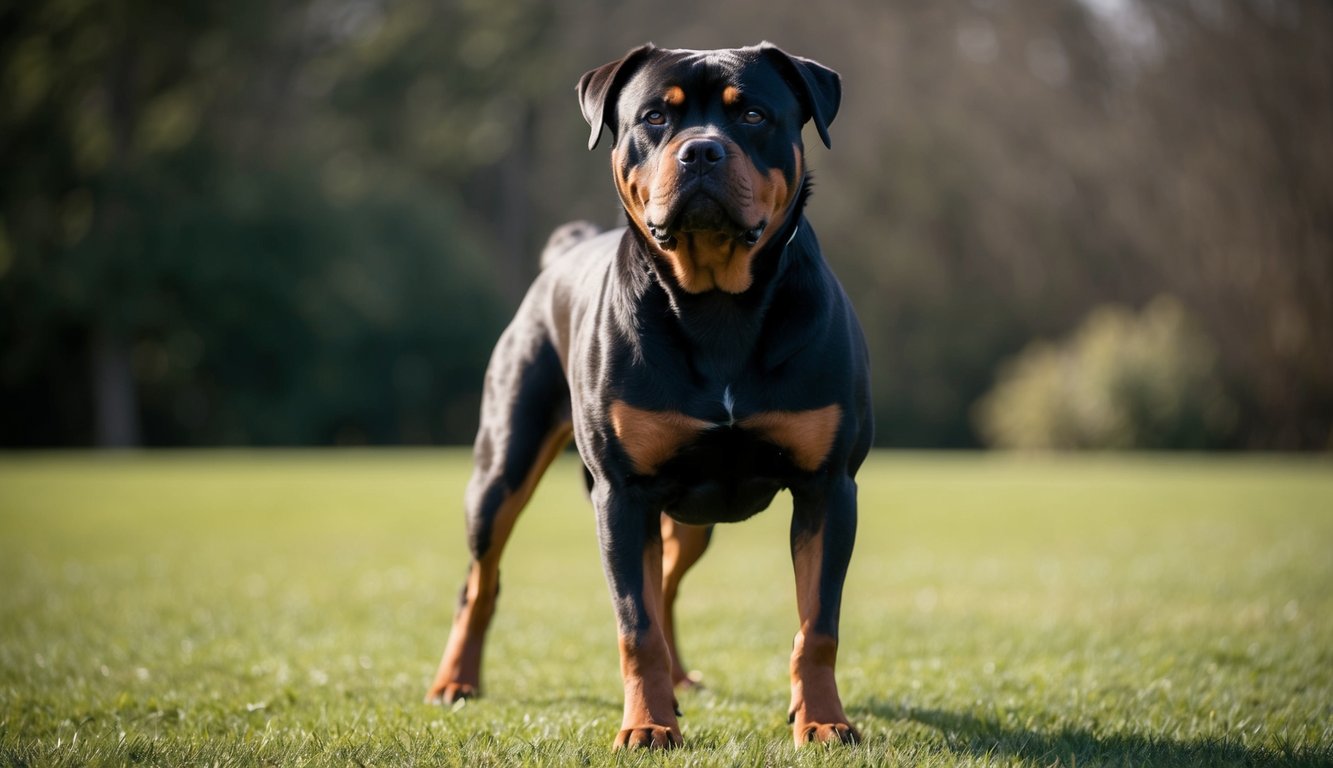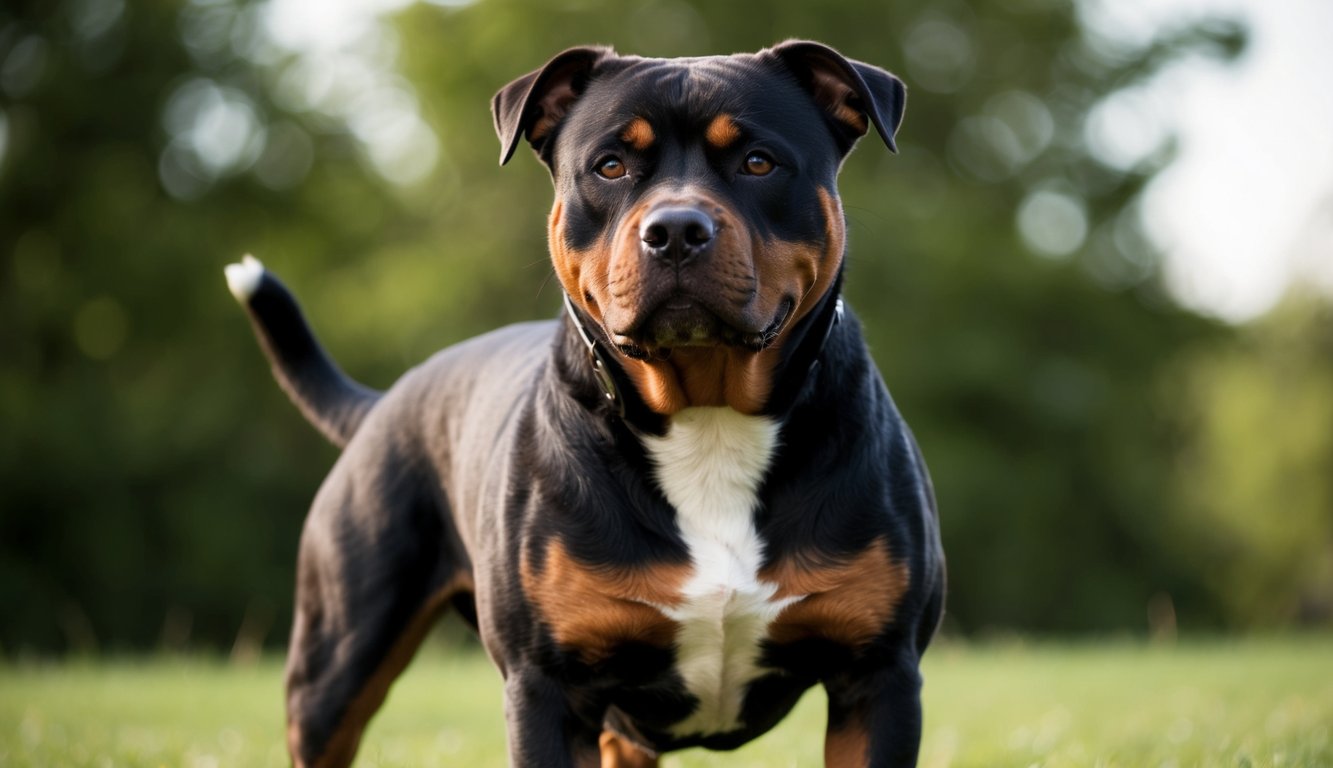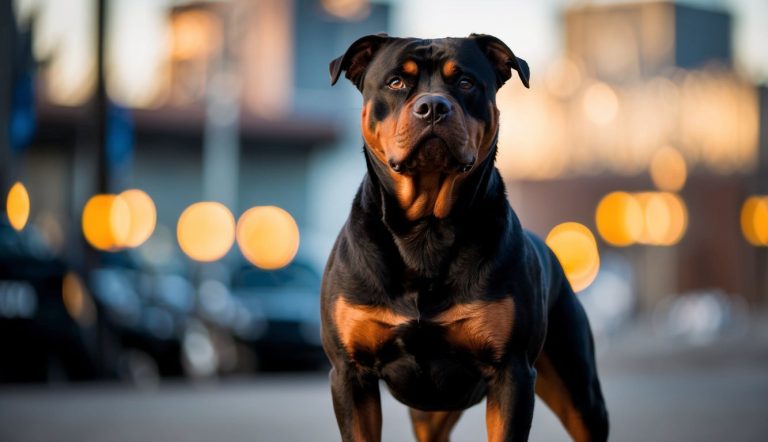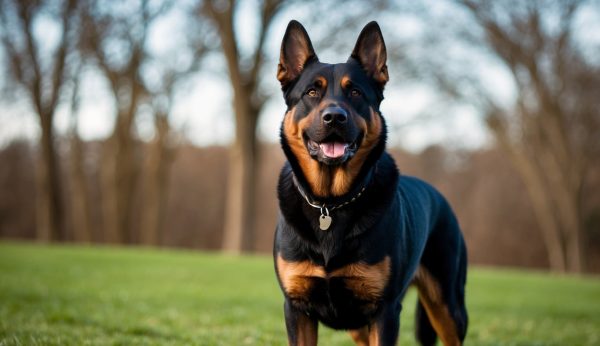The Pitweiler combines traits from both the Rottweiler and American Pit Bull Terrier, creating a strong, athletic, and devoted companion dog. These dogs display remarkable intelligence and physical capabilities while maintaining a loving family-oriented nature. Let’s explore this mix!
If you’re still on the market to buy this mix, PuppySpot currently offers a $300 discount using the code PUPPY300, just click the banner below!
Genetic Composition
- The Pitweiler emerges from crossing a purebred Rottweiler with an American Pit Bull Terrier. This mix is considered a first-generation hybrid, meaning both parents are purebred dogs.
- Each puppy inherits a unique combination of genes from both parent breeds, making individual traits somewhat unpredictable.
- Kennel clubs do not officially recognize this hybrid breed, though its popularity continues to grow among dog enthusiasts.
Appearance Characteristics
Pitweilers typically stand 18 to 25 inches tall and weigh between 40 to 100 pounds. Males often grow larger than females.
Their coat is usually short and dense, requiring minimal grooming. Common colors include:
- Black with brown markings
- Brindle
- Solid brown
- Mixed patterns
These dogs feature a muscular build with a broad chest and strong legs. Their head shape often combines the Rottweiler’s broad skull with the Pit Bull’s facial structure.
Temperament Expectations
Pitweilers display high energy levels and need about 60 minutes of daily exercise. They thrive on physical activity and mental stimulation.
These dogs show strong loyalty to their families and often form deep bonds with their owners. They typically display:
- Protective instincts
- High intelligence
- Playful nature
- Strong work drive
Early socialization helps ensure they develop into well-adjusted adults. These dogs work best with experienced owners who can provide consistent training. Their protective nature makes them excellent watchdogs, but proper training prevents overprotective behaviors.

History and Origin
The Rottweiler Pitbull mix emerged in the United States during the late 20th century as breeders aimed to combine the best traits of both parent breeds. These powerful working dogs bring together centuries of distinct breeding histories.
Hybrid Vigor and Its Implications
The Pitweiler blend combines distinct genetic pools, potentially reducing inherited health issues common to purebred dogs. This genetic diversity often results in enhanced immune systems and better overall health.
These dogs display a unique mix of physical and behavioral traits from both parent breeds. The combination typically produces:
- Enhanced strength and endurance
- Balanced temperament
- Strong protective instincts
- Increased adaptability to different environments
The hybrid’s characteristics can vary significantly between individual dogs, depending on which parent breed’s genes are more dominant.
Health and Care
The Pitweiler needs proper nutrition, regular exercise, and consistent grooming to stay healthy. These strong dogs benefit from preventive care and early health screenings due to their size and genetic background.
Common Health Issues
- Hip and elbow dysplasia are common concerns in Pitweilers due to their large size and genetic makeup.
- Heart problems and allergies can affect these dogs, requiring regular vet checkups to catch issues early.
- Bloat poses a serious risk, especially in deep-chested Pitweilers. Feed them smaller meals throughout the day rather than one large meal.
- Joint issues may develop as they age. Supplements like glucosamine can help maintain joint health when recommended by a vet.
Diet and Nutrition Needs
- Adult Pitweilers need 2-3 cups of high-quality dog food daily, split into two meals. The exact amount depends on size, age, and activity level.
- Protein should make up 25-30% of their diet to support muscle maintenance. Choose foods with real meat as the first ingredient.
- Fresh water must be available at all times. Clean and refill water bowls twice daily.
- Avoid overfeeding as these dogs can gain weight easily. Measure portions carefully and limit treats to 10% of daily calories.
Exercise Requirements
These energetic dogs need at least 60 minutes of exercise daily. Break this into two or three sessions.
Activities should include:
- Brisk walks
- Fetch games
- Agility training
- Swimming
- Tug-of-war
Mental stimulation through puzzle toys and training exercises helps prevent boredom and destructive behavior. Avoid intense exercise right after meals to prevent bloat.
Grooming and Maintenance
- Weekly brushing keeps their short coat healthy and reduces shedding. Use a firm bristle brush or grooming mitt.
- Bathe them every 6-8 weeks or when dirty. Use dog-specific shampoo to protect their skin’s natural oils.
- Trim nails every 2-3 weeks or when you hear clicking on hard floors.
- Clean their ears weekly with a gentle cleanser to prevent infections.
- Brush teeth 2-3 times per week with dog toothpaste to maintain oral health.
Training and Socialization
A Pitweiler needs firm, consistent training from an early age along with extensive socialization to become a well-adjusted adult dog. Their strong personality and physical power make proper training essential for creating a safe, happy family companion.
Effective Training Techniques
- Positive reinforcement training works best for Pitweilers. Treats, praise, and favorite toys help reward good behavior during training sessions.
- These dogs respond well to clear, consistent commands. Short training sessions of 10-15 minutes several times per day prevent mental fatigue.
- Basic obedience commands like sit, stay, come, and leave it should start as soon as the puppy comes home. Teaching leash manners is crucial due to their strength.
- A structured daily routine helps these intelligent dogs understand expectations. Mental stimulation through training games and puzzle toys prevents boredom.
Importance of Early Socialization
- Exposing Pitweiler puppies to different people, animals, sounds, and environments between 3-16 weeks old is critical. This creates a confident, stable adult dog.
- Structured puppy classes provide controlled environments for learning proper dog-to-dog interactions. Regular visits to dog parks should wait until basic training is solid.
- Meeting friendly adults, children, and other pets helps prevent fear or aggression. Positive experiences with various situations build trust and adaptability.
Behavioral Challenges
- Pitweilers can display stubbornness and a strong prey drive. Early intervention prevents these traits from becoming problems.
- Resource guarding requires immediate professional help if noticed. Never punish or challenge the dog, as this can worsen the behavior.
- Separation anxiety may develop without proper conditioning to alone time. Start with short absences and gradually increase duration.
- Excessive chewing or digging often stems from boredom or anxiety. Regular exercise and enrichment activities help manage these behaviors.

Living with a Rottweiler Pitbull Mix
Pitweilers require dedicated care, consistent training, and plenty of physical activity to thrive as family pets. These intelligent and strong dogs need clear boundaries and lots of attention.
Daily Routines and Schedules
- A Pitweiler needs at least 60 minutes of exercise each day. Split this into two or three sessions of walking, running, or playing fetch.
- Morning routines should include a 30-minute walk and breakfast. Feed adult Pitweilers twice daily at consistent times.
- Training sessions should last 10-15 minutes and happen 2-3 times daily. Keep sessions short but focused.
- Mental stimulation is essential. Provide puzzle toys, hide treats, or practice new commands throughout the day.
Family and Pet Interactions
- These dogs form strong bonds with their families and show protective instincts. Early socialization helps them become well-adjusted pets.
- Supervise all interactions with children. Teach kids proper ways to approach and handle the dog.
- Introduce new pets slowly and in neutral spaces. Many Pitweilers can live peacefully with other dogs when properly socialized.
- Set clear rules about furniture access and sleeping arrangements from day one.
Long-Term Commitment
- Pitweilers can weigh between 40-100 pounds when fully grown. Plan for adequate space in your home and yard.
- Budget for quality food, regular vet visits, and preventative care. These dogs eat significant amounts due to their size and activity level.
- Training must remain consistent throughout their lives. Work with a professional trainer if behavioral issues arise.
- Plan for 10-12 years of dedicated care. These dogs need active families who can maintain their exercise needs as they age.




